It is a regrettable fact that authors are mortal. This year has seen at least sixty SFF-related authors, artists, and editors die, some of natural causes, some due to the ongoing pandemic. Here are five books of interest by five different authors we lost in the last few months.
Ben Bova (1932–2020) — Millennium (1976)
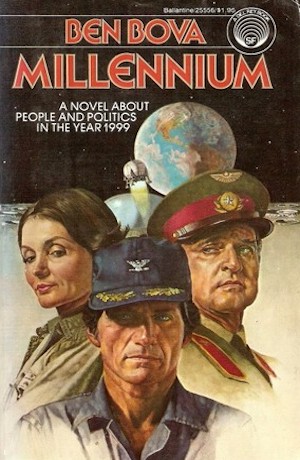
A relic of short-lived American-Soviet cooperation, the American moon base and Soviet Lunagrad are forced to coexist by their intertwined design. Awkward, given that the latest twist in the Cold War, a race to complete duelling orbital antiballistic missile networks, is supplied and managed from the conjoined moon colonies.
Given escalating resource shortages, many expect that whichever power completes their network first will make a bid for planetary domination. Even given functioning ABM networks, the results will no doubt be catastrophic.
Chet Kinsman, commander of the American moon base, does not care to see how World War Three might play out. Neither, as it happens, does his opposite number in Lunagrad. Unlike the majority of humans, the two commanders are uniquely placed to alter history: between them, the Soviets and Americans have enough lasers in orbit for a full AMB network. All the two officers need do is hijack the military resources with which their respective governments have entrusted them—and survive the consequences.
***
Debra Doyle (1952–2020) — The Price of the Stars, co-authored by James D. MacDonald (1992)
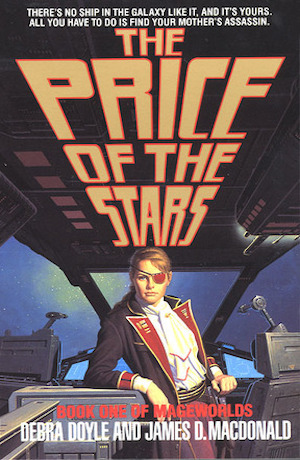
As the daughter of renowned war heroes Jos Metadi and the Domina Perada Rosselin, Beka Rosselin-Metadi could have a life of high rank and public service. She doesn’t want it. Instead, she runs away from home to be a star pilot.
Jos approaches Beka with an offer she cannot refuse: she can have Jos’ justly famous starship, Warhammer. All she has to do for Jos is determine who ordered the recent assassination of Domina Perada Rosselin. Beka is very keen on seeing the mastermind behind her mother’s murder pay for their crime.
Beka has a ship, skill, determination, and a mentor named the Professor. All she needs now is a ragtag band of adventurers and a series of plans, each scheme more audacious than the one before!
The final desideratum: for her unseen enemy not to lead Beka into a trap.
***
Dean Ing (1931–2020) — Soft Targets (1979)
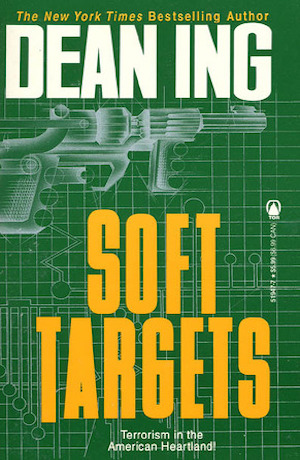
Late Disco-era America is a potential payday for a visionary terrorist looking for quick, easy fame and funds from approving supporters. Hakim Arif, leader of the notorious Fat’ah terrorist group, bears Americans no particular animus. Killing unprepared citizens in large numbers is simply a necessary step to enhance his organization’s revenue scheme. Hakim’s business case is convincing and he manages to assemble a surprisingly inclusive alliance of terrorists drawn from countries ranging from Ireland to Japan, with the USA in their crosshairs.
There are many ways the US could react. It could, for example, invest heavily in laws both draconian and ineffective, which might offer Americans the comfort of ritualistic security theatre. Comedian Charlie George has a better idea. Comedians like George and their journalistic allies (including a thinly veiled Walter Cronkite) will kneecap the terrorists by turning them into laughingstocks.
Mockery is an effective weapon, effective enough to ensure that George and his allies have the full attention of their heavily armed, easily enraged, casually homicidal foes.
***
Richard Lupoff (b.1935–2020) — Space War Blues (19781)
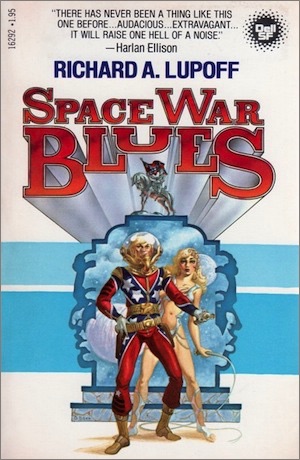
Humanity has spread to the stars and with humans go human prejudices. The bounty of habitable worlds means each group can have their very own planet on which their particular foibles can flourish. N’Alabama has taken the more bigoted proclivities of their ancestors and dialed them up to eleven. Perhaps hilarious for onlookers but quite vexing for the N’Haitians, with whom N’Alabama is at war.
N’Haiti takes the bold step of reassembling and reanimating its war dead to face the enemy once more. N’Alabama, for its part, decides that the best solution is to try to steal the immunity to space radiation used by the peaceful Sky Heroes (descendants of Aboriginal Australians) to brave the vacuum of space, calculating that the pacifist space-nomads will be incapable of resistance. This is a terrible miscalculation with tragic consequences.2
***
Phyllis Eisenstein (b.1946–2020) — Born to Exile (1978)
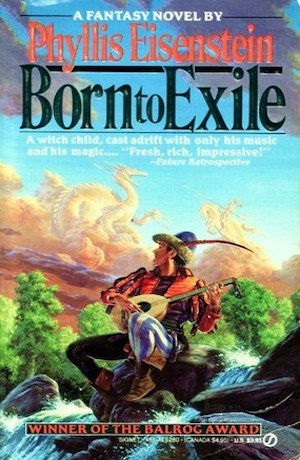
In addition to his musical skills, Alaric the Minstrel has a special talent, a talent so very special that if his audiences ever discovered it, they would immediately commemorate the event with a lavish bonfire with Alaric as the fire’s centerpiece. Alaric can teleport vast distances.
His inborn seven-league boots have saved his life from time to time. Still, the minstrel cannot help but wonder where his gift comes from. His curiosity will lead him to useful information, not least of which is the knowledge that one should be very, very careful about asking questions unless one is certain one can survive learning the answers.
***
As I said, this is just a small sampling of the SF writers we lost in 2020—along with those discussed above, we’ve collectively mourned the passing of authors Mike Resnick, Charles R. Saunders, Carlos Ruiz Zafón, Susan Sizemore, Terry Goodkind, Rachel Caine, and just in the past week, Anton Strout, as well as many others. (For a much more comprehensive list of the writers, editors, and artists, and other creators who’ve died in 2020, please note that Steven H. Silver will be publishing his annual In Memoriam list at Amazing Stories in the next few weeks.)
Please feel free to reminisce, or add the names of other writers and stories not discussed above, in the comments below.
In the words of Wikipedia editor TexasAndroid, prolific book reviewer and perennial Darwin Award nominee James Davis Nicoll is of “questionable notability.” His work has appeared in Publishers Weekly and Romantic Times as well as on his own websites, James Nicoll Reviews and Young People Read Old SFF(where he is assisted by editor Karen Lofstrom and web person Adrienne L. Travis). He is a four-time finalist for the Best Fan Writer Hugo Award and is surprisingly flammable.
[1]Lupoff had an opportunity to be published in 1967 but thanks to Harlan Ellison (see https://en.wikipedia.org/wiki/The_Last_Dangerous_Visions) was forced to defer publication by over a decade.
[2]Tragic for a Sky Hero, I mean. The narrative is not especially sympathetic to the N’Alabamans.










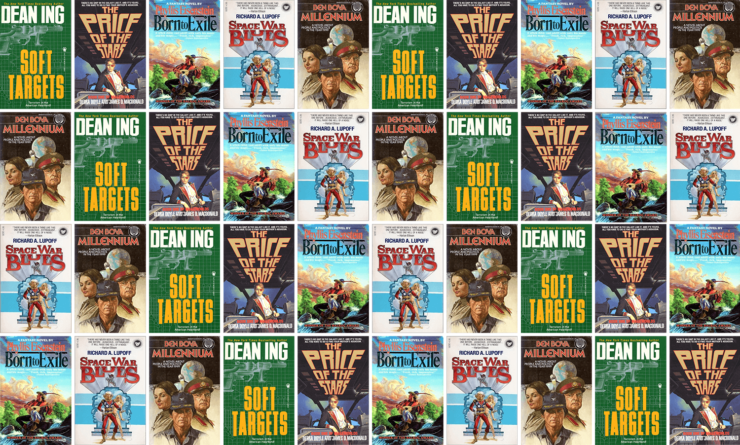
I don’t know how they’d read nowadays, but I remember loving Doyle&Macdonald’s Beka trilogy when it came out; the later attempt to tell the more mystical part of the backstory seemed less focused. Doyle was also responsible for a number of lyrics still sung in the SCA.
How much was the LDV mess responsible for the Lupoff being delayed? The work cited sounds like an expansion of “With the Bentfin Boomer Boys on Little Old New Alabama”, which came out in 1972 in Again, Dangerous Visions.
I especially remember Eisenstein’s Sorcerer’s Son for its demonstration of the perils of assuming someone is your enemy.
I was briefly confused by the first entry in this list and wondering if I had drifted into an alternate timeline, until I remembered that Ben Bova and John Varley are not the same person. I suppose Millenium is a title that might be prone to re-use. I had not previously been aware of this particular instance. Apparently it pre-dates the Varley by a few years.
I dearly loved the Kinsman stories growing up. Especially as a leftist peacenik who would join the Army because it is far more dangerous for the nation if the military doesn’t represent all of us. Those books provided some valuable lessons.
The issue was purely to do with ADV. If Ellison had released Lupoff’s story in ADV, Space War Blues would have been published by 1971. Ellison refused, on top of which ADV itself was late, so publication of Lupoff’s novel was delayed until the late 1970s. When it did come out, SWB had introductions from Ellison superfan Harlan Ellison, and Lupoff himself, with commentary from Lupoff’s agent Henry Morrison in response to Ellison’s snide comments about Morrison. They do not paint Ellison in the best of lights.
The Gateway SF edition of Space War Blues has the ancillary material, which is just as infuriating now as it was back when a Trudeau was Prime Minister.
I’ve never read 3 out of 5 authors on this list. I have the Debra Doyle books on my shelves at home. I enjoyed them when they came out maybe, I’ll re-read them. I didn’t realize she had died. Rachel Caine, Terry Goodkind, and Anton Strout we also author’s I enjoyed. I just hope we don’t lose David Weber too. He is in the hospital with Covid 19 according to twitter. I’m going to go find cat videos or something to cheer myself up now.
I’m glad you included Dean Ing. He was one of my favorite writers in the 80’s and 90’s with his aerospace engineering-heavy techno-thrillers including Ransom of Black Stealth One and Butcher Bird (the latter rather prophetic in terms of assassination by drone), with his Heinleinesque libertarianism tempered by environmental advocacy in books such as The Big Lifters and stories like “Malf” (in Firefight 2000/Y2K). I first ran into his works in the pages of OMNI magazine with Ben Bova as editor — I don’t think most of those stories have ever been collected, I remember several featuring shenanigans customizing race cars.
Was there another SFF writer who used Aboriginal Australians as crew on interstellar sailing ships? I have a vague memory of reading a story with that framing back in the 1970s. It was the first reference to the Dreamtime that I’d come across. Alas, the memory does not include any features of the plot.
@@.-@: I remembered enjoying the ADV version of Bentfin Boomer Boys very much, so I just bought the Kindle edition of Space War Blues from Amazon US. The ebook copy also has the material. And I agree, it reads as very infuriating. Not to speak ill of the dead.
Ing’s an example of an interesting phenomenon I noticed in SF: first published in the 1950s, took twenty years off, started publishing again in the 1970s. As a teenager, I was amazed that someone would restart a career after a hiatus longer than a lifetime but now I see it was only a couple of decades. I have clothes older than that [1]! A number of authors had the same pattern. I wonder if it was driven by the mid-1950s collapse of the magazine industry and implosion of SF that followed?
1: My jacket, for example, is the one my grandfather wore on the transatlantic voyage of the Eppleton Hall, the last paddlewheeler to cross the Atlantic.
Doyle and MacDonald’s Mage Worlds books (especially the trilogy and prequel) are amongst my comfort reads. After over twenty years of rereading them, I can’t judge them without rose tinted lenses, but they stand up well for me. While some of the characters use violence casually, I appreciate the characters who take being medics seriously.
I hadn’t known Debra Doyle had died. The Mageworlds books are some of my favourite space opera – @chip, I re-read them periodically and they stand up very well. They have a flavour very evocative of the original Star Wars trilogy – rogues, rebels and Space Force, plots and betrayals, mysterious force-like power, quick paced adventure, steadily building plot and great characters – without being at all derivative.
I strongly recommend reading them in publication order, which is different than the internal chronology – original trilogy, first prequel, sequel, then the two book far-prequel set.
As a sword and sorcery fan in my teens, I was sad to hear about the passing of Charles R. Saunders. Like Fritz Leiber and Michael Moorcock (and unlike, say, Lin Carter and John Jakes) Saunders expanded and left a unique imaginative touch on the genre. I was even sadder to learn that apparently Saunders died impoverished and neglected. He deserved better.
Thank you so much for including Dick Lupoff and Space War Blues, one of my all-time favorites. I have signed copies of both the Dell first ed’n and the Gregg Press h/c, both highly cherished.
@7: possibly to do with Jeffrey Carver inventing this profession though I don’t recall it as racial:
https://en.wikipedia.org/wiki/Star_Rigger
Only I’m trying to remember which Black comedian had a routine a while back – maybe Dick Gregory? – that used the R word a lot.
I think that’s only coincidental.
Also, characters in X-Men superhero comics named Gateway and Manifold are Australian can translocate, teleport, you to where (usually) there’s s fight on.
@14, thanks Robert Carnegie, but the story I’m fighting to recall would be on the order of 20 years older than Carver’s.
I was honored to get a chance to deliver books to Lupoff a few months before his death. I asked him for a signed book plate and he graciously sent one of his mystery novels signed. Quite a gentleman.
What about Terry Goodkind?
@7
Possibly Rynosseros by Terry Dowling? Recently reprinted in beautiful editions by PS Publishing in the UK.
There was a period in the late 80’s when I would read Millenium piecemeal every year on the corresponding dates in the chapters. By the time 1999 finally hit, I’d moved on to other things, though.
James E. Gunn — SF grandmaster, member of the SF Hall of Fame
@Hywel, presumably well after the book you recall, The Outback Stars by Sandra McDonald was published in 2007; it also featured the Dreamtime.
Looking forward to the four pack of Phyllis Eisenstein books headed my way!
@7 Hywel – There’s Aboriginals, though not Australian, who have a Dreamtime, and work, in a sense, with the hero in DeChancie’s Starrigger trilogy.
Ben Bova’s Mars trilogy are all at the top of my list of favourite SF Mars books. He is/was (remains) a Master of the genre. RIP.
@2: I’m pretty sure I remember Varley at a late-1970’s Balticon asking for alternate titles; he knew Millennium was taken and needed something for the expansion of “Air Raid”. I wonder what kind of maneuvers it took to get his use accepted.
@@.-@: Interesting — I hadn’t realized that ADV was also late enough to cause trouble.
@9: Julian May and Alfred Bester are two other examples; it’s not clear how much of the issue was magazines collapsing (considering that both Galaxy and F&SF started up) as that they couldn’t crank out short fiction fast enough to make a living. (May did lots of non-fiction; Bester got a full-time editing job.)
I dimly remember hearing when I was a tween that there were fewer than a dozen authors making a living from SF.